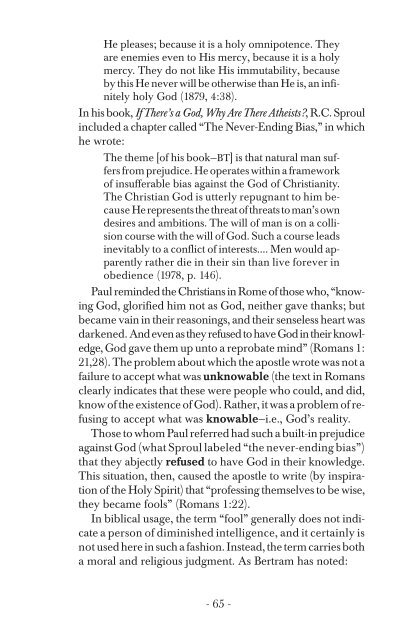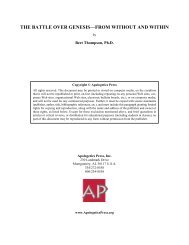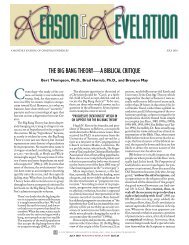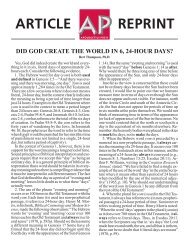The Many Faces, and Causes, of Unbelief - Apologetics Press
The Many Faces, and Causes, of Unbelief - Apologetics Press
The Many Faces, and Causes, of Unbelief - Apologetics Press
You also want an ePaper? Increase the reach of your titles
YUMPU automatically turns print PDFs into web optimized ePapers that Google loves.
He pleases; because it is a holy omnipotence. <strong>The</strong>y<br />
are enemies even to His mercy, because it is a holy<br />
mercy. <strong>The</strong>y do not like His immutability, because<br />
by this He never will be otherwise than He is, an infinitely<br />
holy God (1879, 4:38).<br />
In his book, If <strong>The</strong>re’s a God, Why Are <strong>The</strong>re Atheists?, R.C. Sproul<br />
included a chapter called “<strong>The</strong> Never-Ending Bias,” in which<br />
he wrote:<br />
<strong>The</strong> theme [<strong>of</strong> his book—BT] is that natural man suffers<br />
from prejudice. He operates within a framework<br />
<strong>of</strong> insufferable bias against the God <strong>of</strong> Christianity.<br />
<strong>The</strong> Christian God is utterly repugnant to him because<br />
He represents the threat <strong>of</strong> threats to man’s own<br />
desires <strong>and</strong> ambitions. <strong>The</strong> will <strong>of</strong> man is on a collision<br />
course with the will <strong>of</strong> God. Such a course leads<br />
inevitably to a conflict <strong>of</strong> interests.... Men would apparently<br />
rather die in their sin than live forever in<br />
obedience (1978, p. 146).<br />
Paul reminded the Christians in Rome <strong>of</strong> those who, “knowing<br />
God, glorified him not as God, neither gave thanks; but<br />
became vain in their reasonings, <strong>and</strong> their senseless heart was<br />
darkened. And even as they refused to have God in their knowledge,<br />
God gave them up unto a reprobate mind” (Romans 1:<br />
21,28). <strong>The</strong> problem about which the apostle wrote was not a<br />
failure to accept what was unknowable (the text in Romans<br />
clearly indicates that these were people who could, <strong>and</strong> did,<br />
know <strong>of</strong> the existence <strong>of</strong> God). Rather, it was a problem <strong>of</strong> refusing<br />
to accept what was knowable—i.e., God’s reality.<br />
Those to whom Paul referred had such a built-in prejudice<br />
against God (what Sproul labeled “the never-ending bias”)<br />
that they abjectly refused to have God in their knowledge.<br />
This situation, then, caused the apostle to write (by inspiration<br />
<strong>of</strong> the Holy Spirit) that “pr<strong>of</strong>essing themselves to be wise,<br />
they became fools” (Romans 1:22).<br />
In biblical usage, the term “fool” generally does not indicate<br />
a person <strong>of</strong> diminished intelligence, <strong>and</strong> it certainly is<br />
not used here in such a fashion. Instead, the term carries both<br />
a moral <strong>and</strong> religious judgment. As Bertram has noted:<br />
-65

















